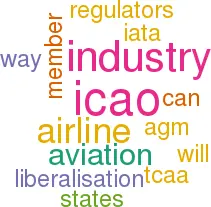Regulators still thriving, alas
June 2001


Any thoughts that the airline industry is on the way to behaving like "normal" industries took a backward step in May. The industry is still hamstrung by regulation and regulators. Airline consolidation is prevented by national and international red tape. Most observers think that global deregulation/ liberalisation is a good thing, but the prospect of this happening seems even further away as a result of the IATA AGM held in Madrid in May. The reason: more organisations throwing their hats into the ring to be leaders in the deregulation process. Bad news for consumers and for investment bankers looking to do cross–border M&A deals.
The IATA AGM is a staged, set–piece affair, and in truth not really a forum for progress. In some respects as a result of the speeches given at this the 57th AGM, the aviation industry has probably taken a step backwards rather than forwards. Two presentations illustrate the point.
A paper entitled "Progressive liberalisation through ICAO" was presented. ICAO strengths were laid out, namely 187 member states and the need to liberalise with "safety" as a priority. ICAO has commissioned a detailed study on airline ownership and control, and is working alongside IATA on producing an updated "airline code of conduct". ICAO also pointed to its other strengths in resolving disputes between airlines and also its understanding of product distribution issues via its code of conduct on CRSs.
So when can the industry expect progress from ICAO? Well it was announced that in March 2003 the 5th ICAO Air Transport Conference will be used to discuss liberalisation issues. The an event is is being touted by ICAO as a "potential pivotal milestone in aviation history". Roll on 2003.
The OECD argued its case for an involvement in the process of setting up a more liberalised regime in partnership with the World Trade Association (WTO). The idea was floated that the General Agreement on Trades and Services (GATS) could be extended to coverage various elements of the industry. However, the key OECD suggestion was the best way forward should be the "lead–sector approach". The concept is to globally liberalise the air cargo market first and at some later undefined point the passenger market can follow suit.
Meanwhile, the US and Europe continue to squabble. The US has now signed 80 "open skies" agreements, and has broken new ground with the signing of the plurilateral agreement with five Asian member states of APEC. The apparent concern for the rest of the world is that the US regulatory authorities will allow further US airline consolidation is allowed and that the world’s strongest and largest airlines become even more dominant.
As for the European Union, it has tied itself to the Transatlantic Common Aviation Area (TCAA). If the EC can win the right to negotiate bilateral agreements on behalf of its member states, then persuade the Americans to go along with the TCAA approach rather than their "open skies" template, the way will be clear to extend the TCAA elsewhere. The two protagonists won’t agree, however.
The sub–segment of the aviation industry that consists of regulators, lawyers and conference organisers is vibrant and expanding. It is as adept at protecting the interests of its members just as effectively (though more subtly) as the most militant pilots’ union.